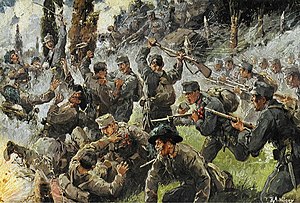Isonzo Front
| Isonzo front | |||||||
|---|---|---|---|---|---|---|---|
| Part of Italian Front (World War I) | |||||||
 Depiction of the Battle of Doberdò. |
|||||||
|
|||||||
| Belligerents | |||||||
|
|
|
||||||
| Units involved | |||||||
|
2nd Army 3rd Army |
5th Army | ||||||
The Battles of the Isonzo (known as the Isonzo Front by historians, and "soška fronta" by the territory's mainly Slovene population) were a series of 12 battles between the Austro-Hungarian and Italian armies in World War I mostly on the territory of present-day Slovenia, and the remainder in Italy along the Isonzo River on the eastern sector of the Italian Front between June 1915 and November 1917.
In April 1915, in the secret Treaty of London Italy was promised by Allies the territory of Austro-Hungarian Empire which were mainly inhabited by ethnic Slovenes. The Italian army wanted to penetrate in central Carniola, present-day Slovenia.
Italian Field Marshal Luigi Cadorna, a staunch proponent of the frontal assault, had plans of breaking into the Slovenian plateau, taking Ljubljana and threatening Vienna. The area between the northernmost part of the Adriatic Sea and the sources of the river Soča (Isonzo) thus became the scene of twelve successive battles.
As a result, the Austro-Hungarians were forced to move some of their forces from the Eastern Front and a war in the mountains around Soča river began.
The sixty-mile long Soča river at the time ran entirely inside Austria-Hungary in parallel to the border with Italy, from the Vršič and Predil passes in the Julian Alps to the Adriatic Sea, widening dramatically just few kilometers north of Gorizia, thus opening a narrow corridor between Northern Italy and Central Europe, which goes through the Vipava Valley and the relatively low north-eastern edge of the Kras plateau to Inner Carniola and Ljubljana. The corridor is also known as the "Ljubljana Gate".
...
Wikipedia
